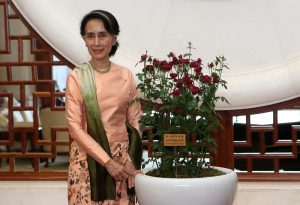Myanmar’s military government has transferred deposed leader Aung San Suu Kyi from prison to a government building in the capital Naypyidaw, an official from her party has confirmed, three days ahead of the expected extension of the current state of emergency.
The AFP news agency cited an anonymous official from Aung San Suu Kyi’s National League for Democracy (NLD) party that the 78-year-old Nobel laureate was “moved to a high-level venue compound on Monday night.”
The NLD official confirmed earlier reports from Burmese-language media that Aung San Suu Kyi, whose government was removed by the military in February 2021, has been transferred to housing used by government officials. Rumors to this effect have swirled since the junta allowed Thai Foreign Minister Don Pramudwinai to meet Aung San Suu Kyi on July 9. The party official also confirmed to AFP that Aung San Suu Kyi had met Ti Khun Myat, the former speaker of parliament, and was likely to meet Deng Xijun, China’s special envoy for Asian Affairs, who it reported is visiting the country this week.
The transfer comes ahead of the expected extension of the country’s state of emergency on Monday. Initially imposed for a period of one year following the coup, the state of emergency has since been extended twice – Monday’s extension would be the third – a testament to the level of resistance that it has since faced.
Aung San Suu Kyi has been under tight control since the morning of the coup, which took place as she and other NLD lawmakers were preparing to be sworn into office at the parliament in Naypyidaw. After initially keeping her under house arrest at her residence in the capital, the junta put the 78-year-old ousted leader in solitary confinement in Naypyidaw Prison in June of last year. During that time, she has been sentenced to 33 years in prison on a number of outlandish criminal charges, including corruption, possession of illegal walkie-talkies, and the violation of COVID-19 restrictions.
What this all means is hard to say. Nikkei Asia reported that there is “speculation the military could make further announcements regarding Suu Kyi next week, coinciding with the consecration of a new marble statue of Buddha in Naypyitaw on Tuesday.” The Buddha in question is the $7.6 million Maravijaya statue, purported to be the tallest marble sitting Buddha in the world, which is due to be inaugurated in the capital on August 2.
It is hard to imagine that the transfer of Aung San Suu Kyi into slightly a less austere form of detention marks a sign of the junta’s genuine desire for reconciliation with forces that it has described as “terrorists” and pledged to eliminate by force. Like the military’s account of Aung San Suu Kyi’s meeting with Don Pramudwinai earlier this month, in which it claimed that she disavowed the anti-junta resistance and the National Unity Government (of which she is the titular head), this is probably best seen as an attempt to leverage Aung San Suu Kyi’s potent symbolic status in order to win over public sentiment and to ease mounting international pressure.
For years, the military has been well aware of Aung San Suu Kyi’s totemic image at home and abroad, and sought to manipulate it to its own advantage. Indeed, the NLD leader’s willingness to endorse the military-led process of reform in the early 2010s was among the primary factors for Western governments going along and ultimately removing the economic sanctions and investment bans that they had erected since the 1990s.
Angshuman Choudhury of India’s Centre for Policy Research today described the move as “literally a leaf out of the junta’s old, deadbeat playbook – designed to placate international audiences, quieten the resistance at home & sow divisions within the revolution.”
Whether this gambit will have quite the same effect remains to be seen. In the West, Aung San Suu Kyi’s glow was tarnished considerably by her apparent collusion in the military’s vicious assaults against the Rohingya populations of western Myanmar. At home, too, the resistance to military rule, while still drawing inspiration from Aung San Suu Kyi, is no longer quite so reliant on her person and has in many ways moved above the old paradigm of political resistance with which she is inseparable.
All this is to say that the shift of Myanmar’s most prominent political prisoner out of solitary confinement may represent a tactical shift on the part of the country’s military, but not a fundamental shift in its desired end goal.

































